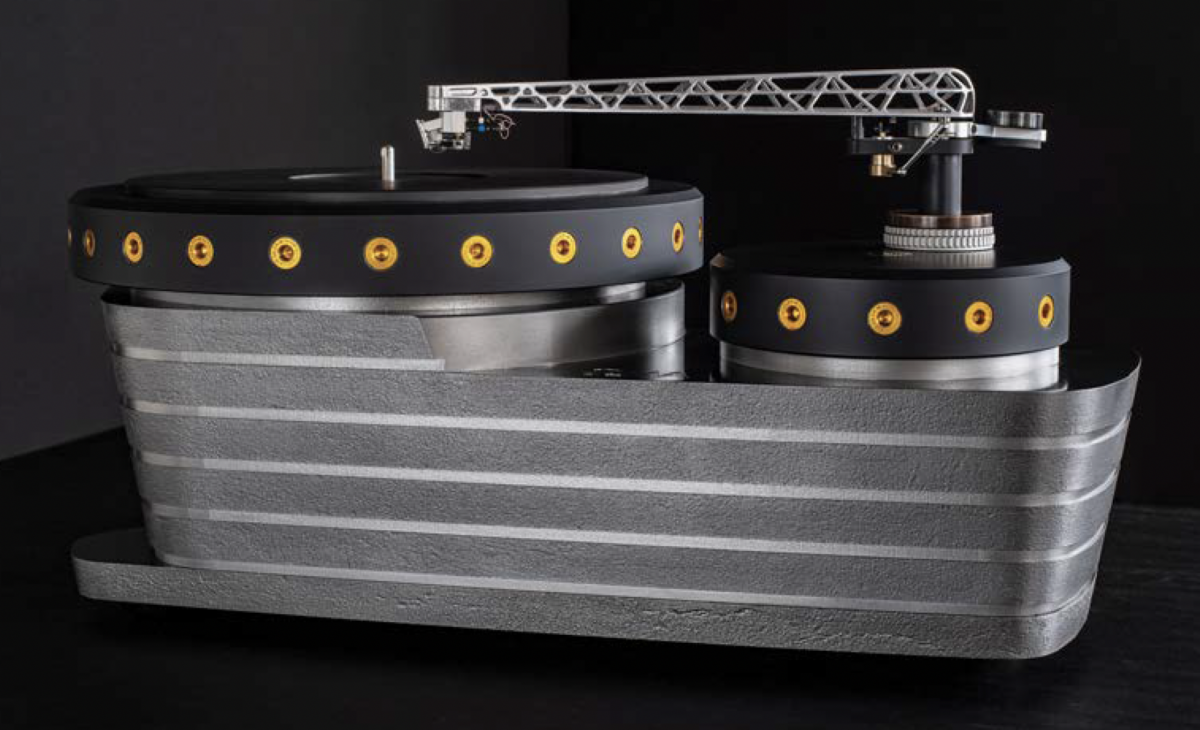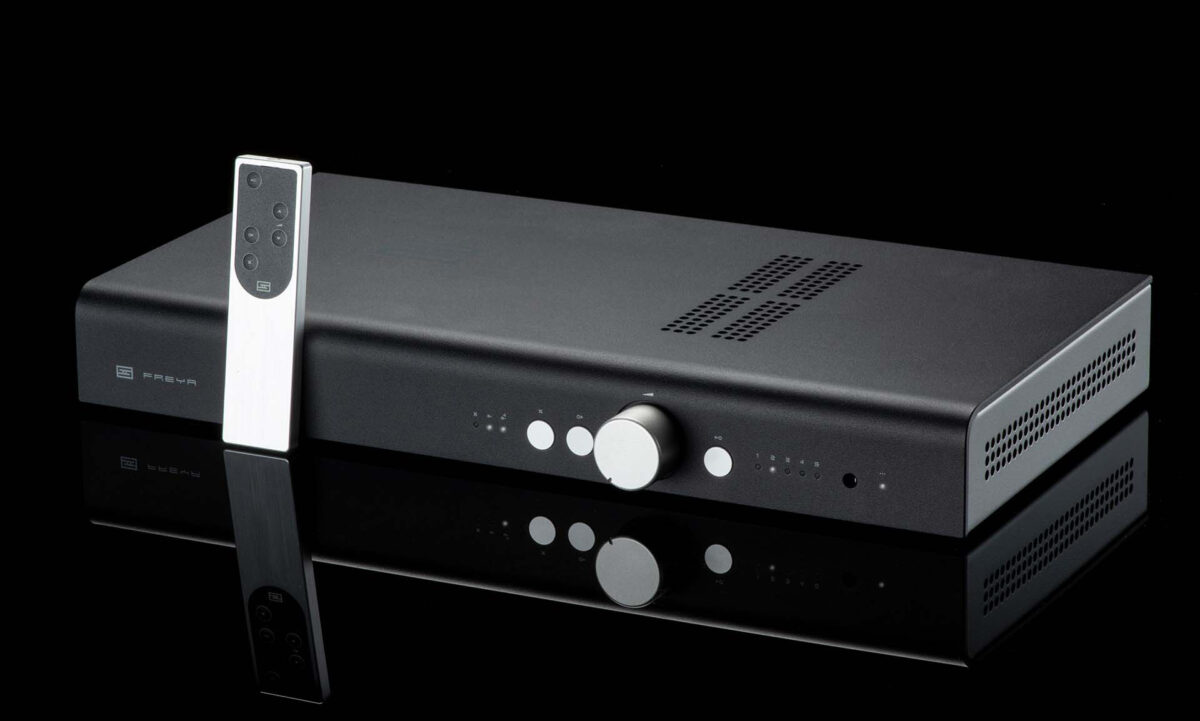
Turntables are inconvenient. That’s the nature of the beasts. They have to be large enough to accommodate and spin a 12″ vinyl disc, along with all the accoutrements. They range from hulking, massive monstrosities that take an entire village to move, down to minimalist cutouts that are barely more than a rotating platter and a tonearm floating on a pedestal. What’s exciting about the Pro-Ject Debut Carbon EVO ($499) is the potential for down-the-rabbit-hole tweaks married to almost absurd simplicity.
That simplicity is a beautiful illusion. The Carbon EVO is Pro-Ject’s upgrade to its popular entry-level deck, and it adds some very interesting features: an improved motor suspension, height-adjustable damped-metal feet, dampening material in the interior of the platter, and speed-swapping at the flip of a switch. Plus, Pro-Ject now bundles the EVO with the Sumiko Rainier cartridge, which is a solid performer. All this augments what was an already attractive, high-quality package, which includes Pro-Ject’s 8.6″ carbon-fiber tonearm with easy-to-use RCA outputs. The Carbon EVO doesn’t come with the built-in phono preamp that many manufacturers shove in there at this price point, but I definitely didn’t mind its absence.
The EVO feels premium. That was the first thing that came to mind. The sleek, glossy finish, the gorgeous tonearm, the solid weight…all made the Carbon EVO seem like a step beyond a standard entry-level deck. I love that it comes in more than one color, and while my review unit was a staid white, I wouldn’t mind checking out the satin-blue, or green, or yellow models. Aesthetics are important, maybe not as important as sound, but we do have to live with these things, after all, and I hate staring at ugly stuff.
But what impressed me the most was the easy setup, something that seems more and more necessary for an entry-level deck. Turntables are tweaky, and yes, very inconvenient, but the best entry models distill that set-up process into something manageable, something that won’t frustrate and completely annoy a first-time future audiophile. It’s an interesting dance of packaging and instructions, but Pro-Ject got it right. The EVO took me under ten minutes to set up, and everything felt dialed-in and ready to go almost immediately. Since I’ve installed more than a few of these entry-level ’tables at this point, I didn’t have to refer back to the manual over and over again; nonetheless, Pro-Ject did a fantastic job of making the steps as simple and straight-forward as possible. Kudos to the designers on that one. I particularly loved the adjustable feet, which made leveling the deck as easy as placing a bubble on the platter. I stuck to using only what Pro-Ject provided for the initial install, then double-checked everything using my own gear, and have to admit that it was really close to perfect from the start. I’d say a total novice could do this without any problems in a half hour or less, provided he was careful.
I’m particularly fussy, though, which shouldn’t be a surprise. So, in the spirit of that fuss, here are two small quibbles. First, Pro-Ject included a felt platter mat. I know, groans and eyerolls, lots of folks like felt, but I find it particularly abhorrent. I’ve just never liked felt, and this was no exception. Very minor thing, and easily remedied. Second, the power cord is strangely short. It barely reached my power receptacle, which was maybe four feet away. Again, this can be remedied with an aftermarket cord, but be aware of this, and reach out to your dealer or Pro-Ject to ensure that whatever cord you choose works fine.
Those gripes out of the way, in almost every other department the EVO really ticked my boxes and then some. The addition of electronic speed-switching, in particular, is a huge bonus, saving folks from having to lift off the platter and touch the belt every time they want to change from 33 to 45rpm. And, let’s be honest, I can’t imagine many people are actually using a belt-switching tool, so they’re grabbing the belt with their dirty, greasy fingers, and getting the whole drive mechanism filthy. With the EVO, you can eat as much fried food as you want and still jump between your favorite formats.
Let’s dive into listening with one of the most exciting releases of 2020: The Cowboy Bebop soundtrack. Anyone in high school during the early 2000s likely saw that show on Adult Swim, and it remains one of the best animated television series ever made—and perhaps one of the best shows, period. The soundtrack, a beautiful blend of soulful jazz and electronica, sounded absolutely great on the EVO. The iconic title track “Tank!” is an upbeat swinging tune, and the deck did a great job of keeping pace. The congas danced and slammed, the horns screamed, and that incredible sax at the very end had the perfect blend of purposefully shrill then buttery smooth. Instant nostalgia-dopamine hit every time I listened, made even better by the very nice pacing from the EVO. Next up was “Space Lion,” a lilting ballad with plenty of reverb and an expansive synth. The saxophone was centered and gentle, with precise tone, and the shimmering synths rolled in in enormous waves. The singing voices toward the end filled in the soundfield, and though I didn’t understand what they were singing, it didn’t matter. The presentation was just right on the EVO, and brought back the show—and the shock that a cartoon could make you feel anything at all—as any good soundtrack should.
For me, right now, listening notes wouldn’t be complete without a jazz recording, and I figure nothing’s better than Art Blakey for testing out a rig’s boogie. Roots & Herbs, recently released in the Blue Note Tone Poet series, features six Wayne Shorter-penned tunes, with the title track acting as a great standout and testing ground. Cymbals were sharp, and Blakey’s spontaneous cries from the drum chair resonated in the background as he encouraged the soloists. Blakey’s drumming, in particular, was crisp and large, with Jymie Merritt’s bass providing a solid, grooving foundation. Lee Morgan’s solo was a great screaming trumpet blast, set squarely in the left channel and echoing outward. I was impressed by the EVO’s ability to sound natural and dead-center on the beat. Blakey’s solo was driving and powerful, typical of the maestro, and the EVO did an admirable job of keeping up, never slipping when the full band came back in.
Next, I turned to something with a little more funk. J&K: Stonebone is a gnarly release on the CTI label, featuring J. J. Johnson and Kai Winding. This particular version is a recent Record Store Day release, and it sounds fantastic. “Mojo” starts with some eerie electric piano, followed by trombone, and finally drops into a nice, deep jam. I was nodding along with that first tempo shift, and the funk factor was powerful through the EVO. The deck did a great job of keeping that tight, steady beat in tune. Bass could feel a touch bloated and a little soft, though it’s hard to say what was to blame for that—the cartridge or the ’table itself. Still, the sound was never unpleasant, and I actually like a bit of low-end bloom—to give bass lines a little more heft. Midrange, particularly the trombones, sounded tight, and sparkled a bit as the brasses hit those higher notes. As the track built, with more instruments coming in, the EVO never lost a step, and the soundstage had solid depth to it.
I ended my listening with an interesting release called 2nd Wave by Roland Hayes on the Black Jazz label, recently reissued by Real Gone Records. It’s a quartet session with two keyboards, which is a fascinating sound. The keys shimmer in spots, and get dark and dirty in others. Overall, it’s a really great record. However, keeping the two keyboards separate can sometimes be a challenge, but the EVO never felt like it struggled to keep up. Even on the upbeat title track “Second Wave,” the shimmering runs and lush chords blended, interplayed, and danced around some really tight drumming. From what I could tell, one set of keys was in the left channel, the other set in the right, with drums and bass dead center. I could almost see them up on a stage like that—two dueling players. It’s one of the oddest quartet sessions I’ve ever heard, and truly great.
By the time I finished with this review, the Pro-Ject Debut Carbon EVO had disappeared into my system. It sounded terrific, and for a while there I was totally content with a turntable that costs a fifth of my main deck. That’s almost astonishing, but not quite, not really, since I know Pro-Ject makes great-sounding gear at reasonable prices. The EVO is no exception, and I can easily recommend it to anyone looking for an entry-level turntable that’ll perform for years to come. It’s the sort of turntable that a first-time audiophile could build a system around, and not need to upgrade for a long while. To my ears, this is the one to beat.
Specs & Pricing
Type: Belt-driven turntable
Speed: 33/45rpm electronic speed control, 78rpm-compatible
Wow and flutter: 33rpm, ±0.19%; 45rpm, ±0.17%
Signal-to-noise: 68dB
Tonearm: 8.6″, carbon-fiber, one-piece tonearm
Effective tonearm length: 218.5mm
Effective arm mass: 6.0g
Overhang: 18.5mm
Dimensions: 16.3″ x 4.4″ x 12.6″
Weight: 13.2 lbs.
Price: $499
SUMIKO (North American distributor)
6655 Wedgewood Road N
Suite 115
Maple Grove, MN 55311-28
sumikoaudio.net
project-audio.com

By Drew Kalbach
I have a degree in English from Temple University and a Masters in Fine Arts with a specialty in poetry from the University of Notre Dame. I’m a full-time self-published author with over 100 books in both romance and men’s adventure fiction.
More articles from this editorRead Next From Review
See all
Oswalds Mill Audio K3 Turntable
- Apr 12, 2024

2023 Golden Ear: Schiit Freya S Preamplifier
- Apr 12, 2024




















